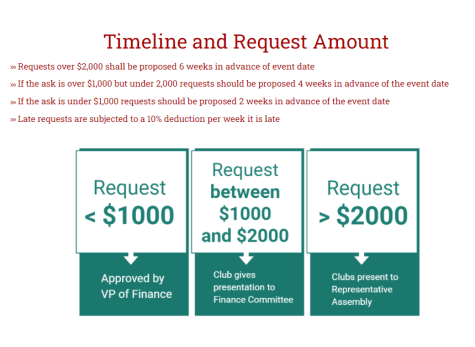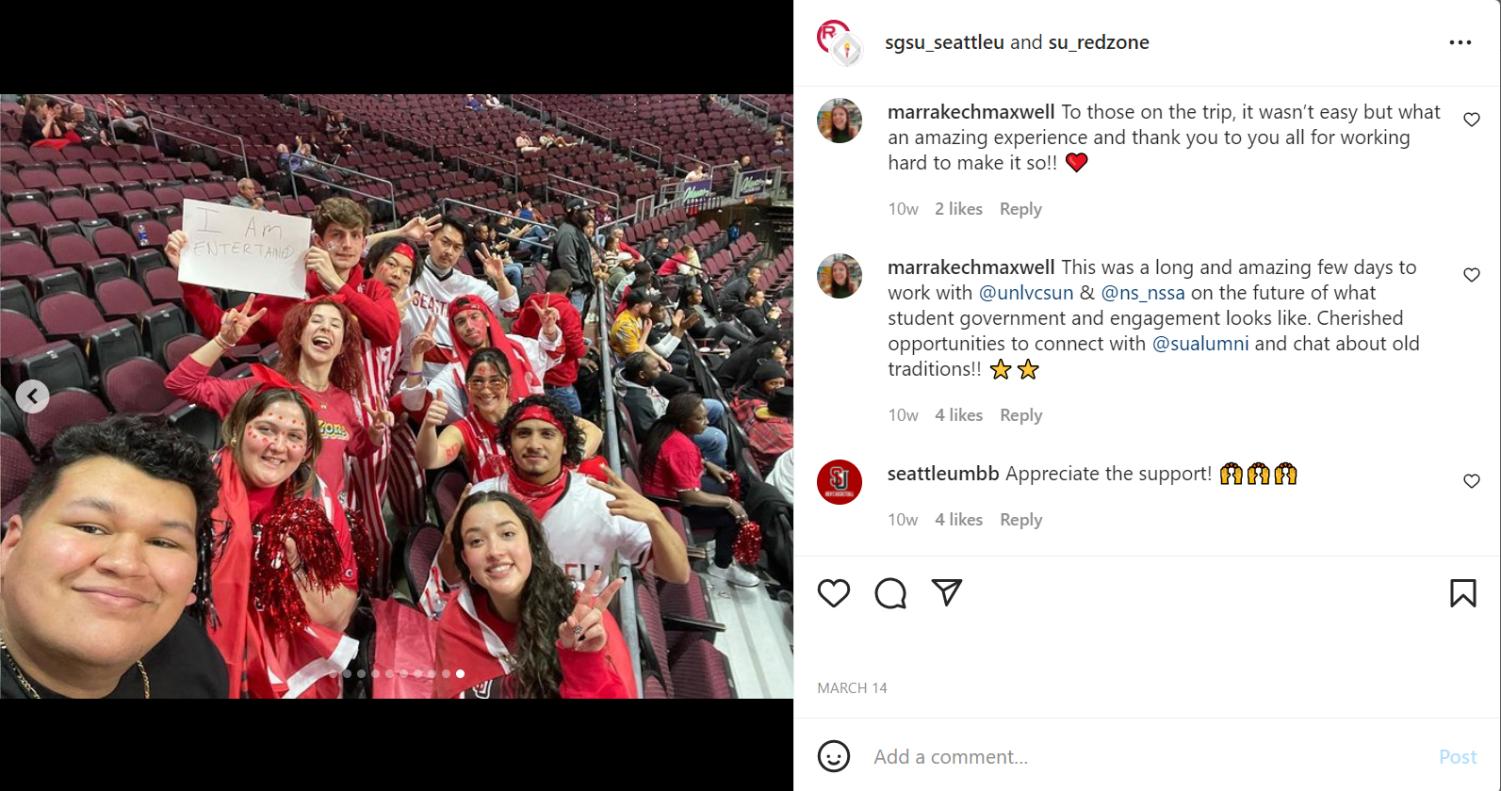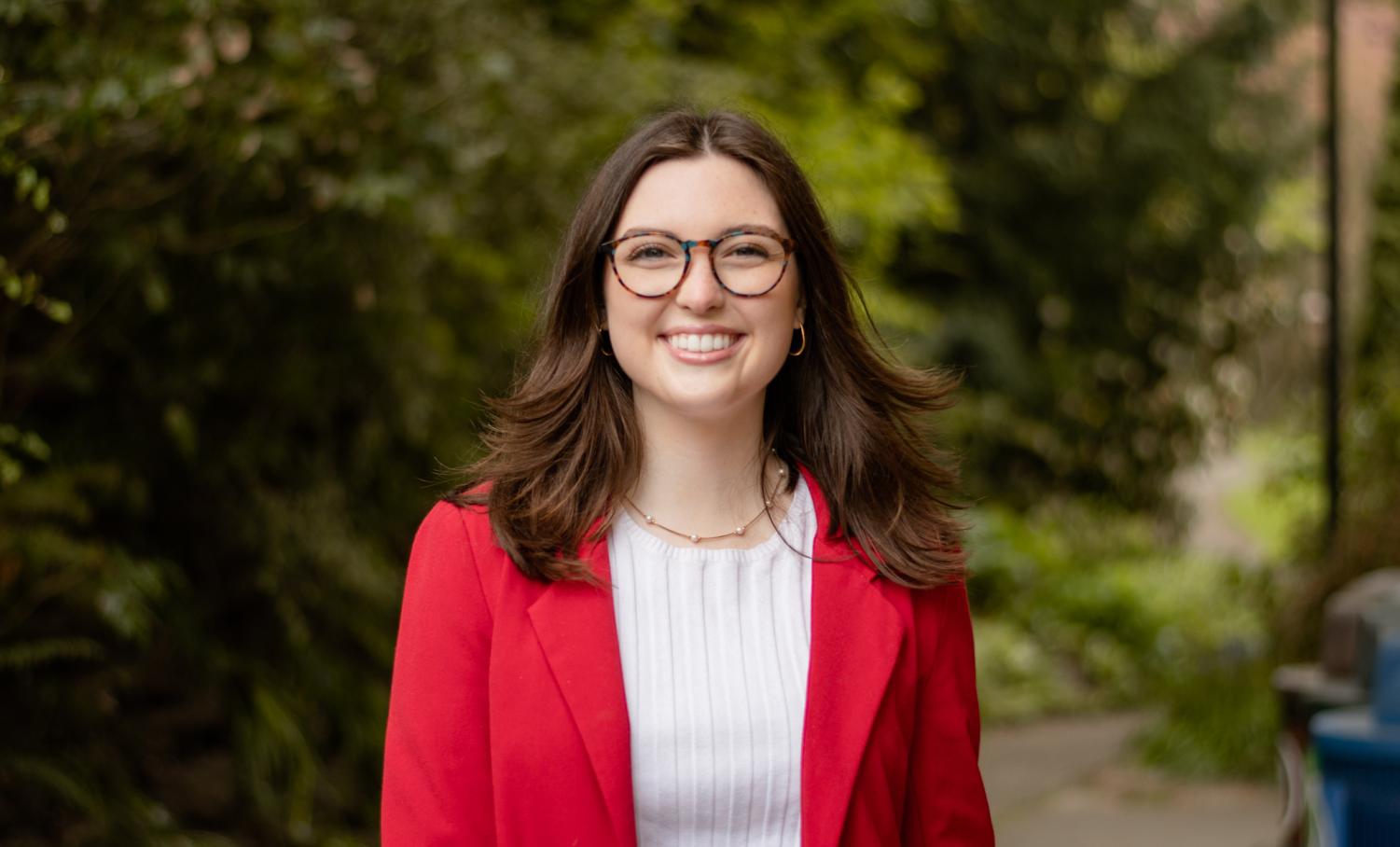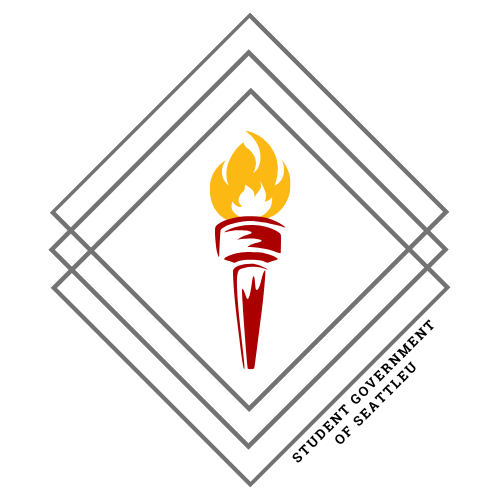Seattle University Student Government Ends Year with Controversy
The Student Government of Seattle University (SGSU) may not have as high a profile as the national government, but this year its operations were similarly rife with internal controversy over spending, firings and election integrity.
As SGSU prepares to wrap up the year, President Marrakech Maxwell’s tenure and the actions of the executive council are being critically evaluated by former student representatives and staff members. Their choice to spend $6,000 financing an executive council trip to Las Vegas, the terminations of several student representatives and questions surrounding how the recent presidential elections were conducted have drawn particular ethical concerns.
A Trip to Las Vegas with RedZone
At a winter quarter representative assembly, SGSU met to allocate and appropriate funds for campus groups. RedZone, a student-led organization that aims to increase school spirit for the student body and athletics department, gave their presentation to SGSU in conjunction with Vice President of University Affairs Sarah Trapizona. They requested $6,000 in funding for a trip to Las Vegas for students to support the university’s basketball teams at the Western Athletic Conference Championships March 8–12. During the presentation, the group requested to send 10 students selected by Center for Student Involvement, including six RedZone members who had worked on the project and an advisor. The vote for funding passed unanimously despite remaining questions from staff members.
As current Chair of University Affairs, Third-year Business Analytics major Avery Hultgren felt there were unaddressed concerns early on in the presentation and throughout the voting period.
“RedZone came in and asked for $6,000—to put that into perspective, our usual ask is for maybe $2,000 for 200 to 300 people. This was $6,000 for 11 people, so that was a really big change,” Hultgren said.
He also found the timing of the presentation surprising, as most organizations are required to ask for funding at least two months in advance of their event. The trip was scheduled for a week after the presentation, which Hultgren considers grounds for denying a request. Most alarmingly to Hultgren, the presenters kept who would be attending the trip confidential from representatives.

“The question came up of who’s going—who are these 11? The plan was to have students go to more games, to care more about basketball and support our team—is it a random drawing at a basketball game, something like that? It was completely anonymous students,” Hultgren said.
These remaining four students out of the eleven selected for the trip were executive members of SGSU, which representatives and staff members note they were unaware of until after their vote was passed.
Anna Smalley, a third-year public affairs and economics major and the director of elections, felt this trip could have provided a place for students who did not feel as connected to the school.
“What about students? We’re putting this together for students. Later that night, I asked and they already had a list of who was going, and it was internal SGSU members. This is something that would have been really meaningful to a lot more people. Instead, we used it on people who already have those experiences of being a part of campus,” Smalley said.
Smalley and Hultgren noted that the presentation and vote proceeded unusually, both maintaining that their questions were shut down by executive members and representatives were quieter than in other meetings.
“I was disappointed as the representatives didn’t ask as many questions as they usually do. It was just me, Anna [Smalley] and a few others asking questions, all of which got shot down quite a bit,” Hultgren said.
Executive members of SGSU who attended this trip also felt that they experienced a lack of transparency.

Sarah Trapinoza, a fourth-year political science major and the vice president of university affairs, attended the Las Vegas trip. She was frustrated about the trip’s planning and execution. She recounted not knowing the schedule of transportation or flights until the night before.
“I think there were a lot of feelings and anger in different directions, but I personally am apologetic towards the fact that I wish it was more transparent. I wish there was more communication,” Trapizona said.
Trapizona also shared the stress placed on attendees, particularly due to the timing of the trip immediately preceding finals week.
“When we were in Vegas, we were not living it up. We barely slept—it was the week before finals and we were doing our final projects in the hotel room. It was a great time to get to know the ins and outs of RedZone, but I wish it was better communicated. I do apologize for how it was executed because that is not something I am proud of,” Trapizona said.
2021–2022 Student Body President Marrakech Maxwell, a fourth-year environmental studies and public affairs double major, felt surprised by the backlash to the event.
Both Maxwell and Trapizona denied any prior knowledge of their inclusion on the trip when the vote was cast, as well as the possibility of influencing the representatives’ vote.
“It was really complicated because I was really excited, and I was surprised because a lot of people got really angry. You can’t please everybody. I’m really glad we got to support the men’s basketball team, and I’m sad people didn’t feel it was transparent and communicative, but there’s nothing I can do about that other than say I’m sorry,” Maxwell said.
Maxwell mentioned being excited to attend once it was proposed to her, despite not being able to account for who planned the event or who allowed the executive council to attend.
“I was in the office and talking to someone about it and they were like ‘would you be interested in going,’ and I was like ‘yeah that seems really cool since I’m a senior,’” Maxwell said.
The allocations fund from which the $6,000 were taken went dry in April, meaning other clubs could not benefit from the fund as the year came to a close. Frederick von Brandenfels, a first-year business student and former At-Large Representative, argued that it was a poor use of money that did not benefit the student body.
“We’re not supposed to use that money for our own good, we have other budgets for that, and we actually don’t have the money to do that, so that’s where a lot of people are mad, because that money can’t go to a different organization or club—because we ran out at the end of April,” Brandenfels said.
Representative Firings
The uneasy relations between the Executive Council and SGSU representatives became particularly clear as elected members of the student government were fired over the course of the year.
Grace Harvey, a fourth-year accounting major and former non-traditional students representative, was terminated from their position in February. After elections for SGSU representatives wrapped up during fall quarter, the student government planned its customary retreat for members. Unfortunately for Harvey, not all of the programming for the event could accommodate their needs. In an email sent to SGSU, Harvey expressed their disappointment with the fallout from the event planning.
“I was saddened to find, once I received the itinerary, that the weekend events did not accommodate my disability access needs. And, because of the short notice, I didn’t have enough time to arrange accommodations to participate more fully,” Harvey wrote.
Harvey stated that their position at SGSU was threatened since they could not fully participate in the event programming. They attributed the alleged discrimination to an undemocratic atmosphere within the student government dominated by the Executive Council.
“The way it works in practice is that the executive team is elected for everyone else and they set the agenda. If you want to work on anything you have to spend a year as a representative and then stay through a second year and work the summer—that’s just the way that it’s set up. So there’s really no room to disagree with anyone about anything, which I feel like it’s not really how governments function,” Harvey said.
Harvey’s difficult experiences with SGSU continued throughout their term in fall and winter quarter, culminating with their removal in February by Executive Council members. Harvey stated that their firing was not conducted in accordance with SGSU’s representative removal policies, and filed an Office of Civil Rights complaint, starting an ongoing investigation.
Hultgren recalled a lack of communication about Harvey’s removal.
“Technically, there’s a three-strike policy where if you do something wrong, you’re supposed to meet with everyone. I know in this person’s case, they never really had any formal meetings with everyone, and they were never told that the things they did were strikes,” Hultgren said.
Brandenfels, who was also removed from his position, echoed Harvey’s frustrations about a lack of formality in SGSU representative firings. He noted that (by his own count) there have been seven staff turnovers at SGSU this year, including the loss of the university’s disabilities and non-traditional representatives.
“About two months ago, in March, right as we got into spring quarter, I was called in for a meeting with our Executive Vice President and it was formerly called an accountability meeting,” Brandenfels said.
He was accused of using a disrespectful tone toward other SGSU members, and was told he would no longer be moving forward in student government.
“The thing about that meeting that I didn’t like was that everything was very unclear. What I would expect from our organization is accountability from the bylaws of the student government constitution,” Brandenfels said.
Instead, Brandenfels alleged that he was informally summoned to a meeting in which he was not given concrete examples of violations of bylaws or avenues for improvement before he was let go.
“I noticed little tendencies throughout the year that are not very transparent,” Brandenfels said.
Elections Controversy
The aforementioned controversies were capped off this year with the election of SGSU’s 2022–2023 student body president. The two candidates, Braelyn Scheer (current Executive Vice President) and Anna Smalley (current Director of Elections) are both current SGSU members. Smalley had to temporarily step down from her role as Director of Elections during the race itself. This left a gap in who was to run the election proceedings, which landed with Trapizona.

“[Trapinoza] is really good friends with Braelyn [Scheer], who was running against Anna [Smalley]. So from the start, I felt like it wasn’t the best idea,” Hultgren said.
On the first day of the election, Smalley was hit with four violations of the elections code, but did not receive descriptions of the violations, causing her confusion. While violations were pending, Smalley was not allowed to campaign.
“I spent days racking my brain like ‘what have I done wrong, I have no idea, I’ve read the election code 50 times over, and that’s the thing … I know this so well, I know not to break rules,’ I’m passionate about fair elections and everyone having access to the same activities and materials during the campaign, and I just cannot fathom I would have done something wrong in the very first 24 hours that I was a candidate,” Smalley said.
Three days later, Smalley’s campaign materials were approved and she was allowed to continue campaigning. She was frustrated that she had been halted from campaigning without a concrete claim made against her, but continued working after the allegations were dropped.
On the night that the elections ended, Smalley was disqualified from the race after the ballots came in.
“Friday night I got an email saying there had been election code violations against me once again, which I was again surprised to hear,” Smalley said. “But, per the elections code reading that the elections committee decided upon, I was disqualified. Which was really surprising to hear. No trial, no hearing, so I don’t know. I still don’t agree with it, but that’s for a later conversation.”
The Spectator was unable to obtain the student government elections code in advance of the publication of this article.
Smalley stated that she has received confirmation that she received more votes than her opponent. The Spectator has requested official ballot counts from SGSU and has yet to receive them.
Brandenfels echoed Smalley’s disagreement with her disqualification, while noting that her previous position as Director of Elections was inopportune from his perspective.
“I read the document that disqualified Anna—it’s completely bogus. It feels hurtful, like it’s made to attack,” Brandenfels said.
Hultgren reaffirmed Brandenfels’ perspective, noting that it caused him to cease pursuing work at SGSU next year.
“It was 100% unfair, which is something I was not okay with, so I dropped out after that point. I am in SGSU, but I dropped out of the race and I won’t be an official part of SGSU next year,” Hultgren said.
As the year comes to a close, SGSU looks back on a tumultuous year in which disagreements about overspending, representative firings and elections code caused rifts between the executive council, representatives and staff. Whether the outlook for SGSU improves next year will depend on the leadership from the student government’s next President Braelyn Scheer as well as the Seattle U community who will vote for new representatives next fall.





Marrakech Maxwell
Jun 2, 2022 at 12:01 pm
1. “As SGSU prepares to wrap up the year, President Marrakech Maxwell’s tenure and the actions of the executive council are being critically evaluated by former student representatives and staff members. Their choice to spend $6,000 financing an executive council trip to Las Vegas, the terminations of several student representatives, and questions surrounding how the recent presidential elections were conducted have drawn particular ethical concerns.”
• Incorrect. SGSU representative assembly met to approve the funding for all projects. Executive and staff members do not vote and cannot approve appropriations.
2. “Chair of University Affairs, Third-year Business Analytics major Avery Hultgren”
• The position is Chair of Internal Affairs.
3. “Most alarmingly to Hultgren, the presenters kept who would be attending the trip confidential from representatives.”
• It is SGSU funding policy that members are not allowed to ask specifically who all is going, a rule created long ago from previous teams that Sarah Trapizona, VP of University Affairs stated in that meeting. This rule is subject to change in the upcoming finance bylaws change!
4. “These remaining four students out of the eleven selected for the trip were executive members of SGSU.”
• False. The people who attended where the president, the VP of University affairs, a staff member for social media presence and previously the multicultural representative, however they had recently been sworn in as the new Executive Vice President.
• Additionally, our role on this trip was to communicate and work with other student governments. We met with UNLV and the Nevada State College governments.
• Personally, on my end, after I was approached and asked if I wanted to go on the trip, I had arranged with the alumni office to connect with SU alum as Student body president (and met with previous SU student body presidents from years past at the basketball game). I believe that it wouldn’t have been responsible for SGSU to ask randomly selected students to do the work that we were elected to do: I.e., advocacy, school engagement, student government work, etc.
5. “Both Maxwell and Trapizona denied any prior knowledge of their inclusion on the trip when the vote was cast, as well as the possibility of influencing the representatives’ vote.”
• This is not true. I was not asked this question in any interview. I was told that I was not allowed to disclose the fact that our VP of University Affairs had invited me as one of the students (aka the Student body President) and I felt it appropriate that I go after working in SGSU for 4 years and wanted to support the initiative of Redzone to bring community together.
• Additionally, I was told multiple times I was not responsible for any planning or communicating for this event, this was a project taken on by other SGSU executives.
6. “The allocations fund from which the $6,000 were taken went dry in April, meaning other clubs could not benefit from the fund as the year came to a close.”
• Student government funds ran out this year due to the number of requests received in the Spring quarter which was unlike any Spring quarter prior. This is exciting and good news as it has meant that more clubs were interested in having events than previously seen. In the future SGSU can better save and prepare for Spring quarter.
7. “Harvey’s difficult experiences with SGSU continued throughout their term in fall and winter quarter, culminating with their removal in February by Executive Council members.”
• Representative Harvey was removed by their own peers on the internal SGSU steering committee. The only executive to be involved in the removal conversation was the executive vice president (EVP) who is required by governing documents to oversee all removals.
8. ““Technically, there’s a three-strike policy where if you do something wrong, you’re supposed to meet with everyone. I know in this person’s case, they never really had any formal meetings with everyone, and they were never told that the things they did were strikes,” Hultgren said. “”
• This is not a correct statement. Unfortunately, Harvey was contacted by the EVP several times in person, through emails, and over Slack for accountability meetings and follow-up conversations. The EVP has since left the organization also in tandem with accountability meetings. These conversations between Harvey and the EVP led to looping in the steering committee who ultimately decided removal.
9. “He [Avery] noted that (by his own count) there have been seven staff turnovers at SGSU this year, including the loss of the university’s disabilities and non-traditional representatives.”
• This sentence is false. There have been 8 position changes/turnovers (all for a multitude of different reasons I’m happy to explain). Our executive vice president (1), the non-traditional representative, which was never vacant, (2), the chair of external affairs (3), chair of internal affairs (4), at-large representative (5), disabilities representative (6), sophomore representative (7), and we were finally able to find an athletic representative (8). Though we no longer have our disability rep, SGSU has its non-traditional representative position filled and has remained that way since Fall.
10. This article is wildly incorrect in many places, and I am incredibly disappointed by the execution. I’m in full and deep support of transparency and accountability, especially of SGSU, and I encourage all students to get more involved with SGSU in the future to be involved in how funds are used. I wish SGSU had been more communicative to students this year, but I also hope that SU students will get more involved with SGSU too.
martha
May 31, 2022 at 8:25 am
lol f**k su, they can give a bunch of white kids 6k but wont help their students in need